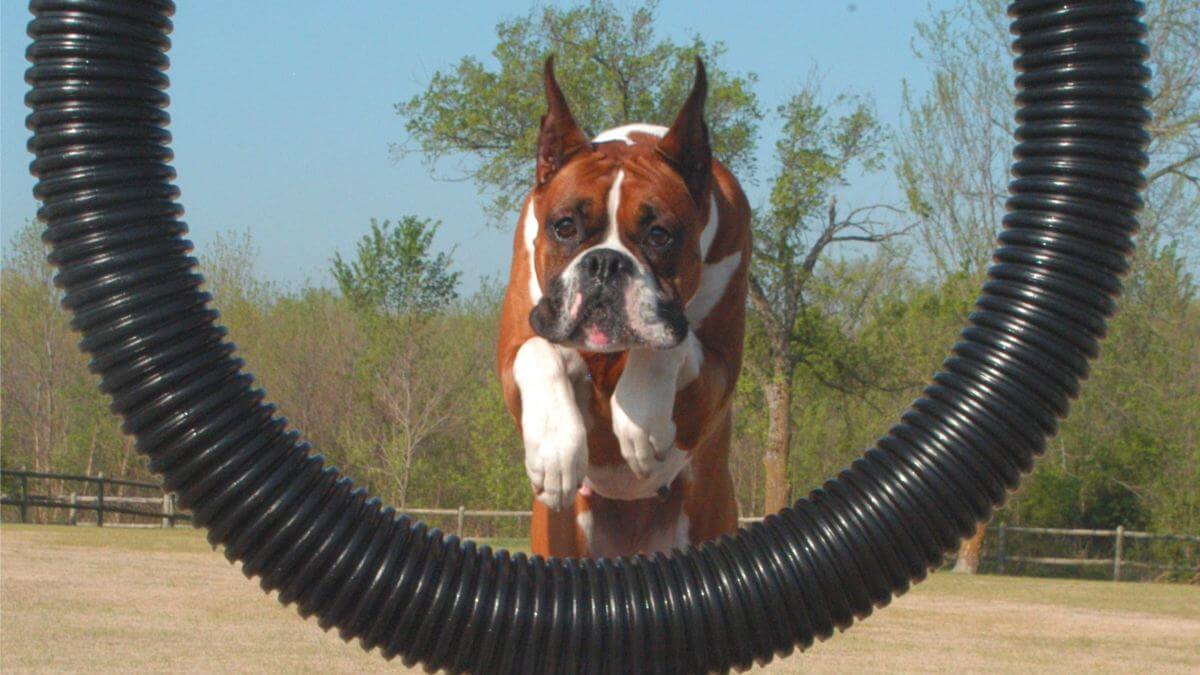


Home » The Boxer – Inside Out

This article was originally published in Showsight Magazine, June 2014 issue.
Boxer is a complicated animal. More than any other dog, his moods mirror those of his master. His sensitivity is astonishing.
While he is a great clown, always ready to run and play, he is also a dog of great fortitude and courage if threatened. His frontally-placed, large dark eyes are almost human in their expression, and in them you can clearly read his state of mind.
His demeanor speaks to his nobility, body and soul. A dog with these sensitivities is no windup toy; he is not an animal who can always be counted on to do what is expected. He is not a dog for everyone, and if you’re thinking about owning a Boxer, you must decide whether the characteristics of the breed will appeal.
The Boxer is often the very definition of “independence.” While he may mellow brith age, a Boxer is a physically active dog. He loves to roughhouse—although not a natural retriever by nature, he will fetch an object and cheerfully dare you to take it back. Sometimes these games escalate into “Let’s not come when called.” Not the breed’s most endearing trait.
He likes his space—he will refuse to move over if you attempt to push him aside. He has a tendency to jump, and there is considerable muscular force behind these loving greetings. This agile leaping is no doubt a part of his genetic heritage: His name derives from the German word “boxen,” which, of course, means “boxer.”
Although it cannot be definitely proven, the name probably derives from the Boxer’s habit of playing with his front paws. He uses these paws almost like hands—to poke, to punch, or to gently cradle those he loves.
One cannot underestimate a Boxer’s strength. Tough of medium size, usually between 22″-25″ at the withers (depending on gender), he is quite capable of knocking an adult man to his knees.
It is therefore imperative to train a Boxer to curb his natural tendencies to leap and make body contact. Remember, he was bred to overpower wild bear and bison in the forest, so these instincts come quite naturally to the Boxer. Happily, he has no interest in “holding” humans with his strong under-shot jaws.
He will, however, grip a play toy with unshakable enthusiasm, and one of his great delights is to pull with you in a cheerful tug-of-war. Until he is trained, the Boxer will also have an instinctive desire to pull on his leash; he could easily drag you down the street.
It is obvious that he must be firmly instructed in “civilized” behavior. He is not a dog for the proverbial “little old lady”—until he has learned his manners.
While I have called your attention to the Boxer’s physical strength, it must be said that all his clownish and rough-and-tumble ways are usually tempered with good judgment. While he may gallop right at you as if to mow you down, he will turn (usually) aside at the last delicious moment.
Nonetheless, he may be too much dog for the smallest of children, although he will love them beyond measure. In fact, Boxers are among the most patient, tolerant and loving of children’s pets, and will often gravitate to the child in a room full of people of all ages.
I will always remember our aging Boxer in her yard, sleeping soundly, when the neighbor’s toddler poured a cup of sand in her ear. Startled, she leapt to her feet, but when she realized who had done the deed, she simply shook herself and moved off. There was never an aggressive moment.
The Boxer will treasure a favorite toy from puppyhood into old age. Not a naturally destructive breed, he may carry this toy around for months or even years without harming it significantly. He trains easily for Obedience and Rally, but a Boxer is not content to perform repetitious exercises without a reason—he bores easily.
He needs to know “why.” Years ago we had a Boxer who learned to jump hurdles in the backyard in a nanosecond. However, after the third time my father told her to jump, she simply sat down and wagged her tail. Clearly she had “been there and done that.” Typical Boxer!
Often labeled ‘stubborn,’ a self-respecting Boxer is anything but. He just needs a job he likes and understands. Many Boxers are great crowd pleasers at Obedience trials. If the spirit moves them, they may wander over to greet the gallery instead of heeling at their owner’s side.
Just when both owner and judge are at their most frustrated, the Boxer may rush to finish the exercise flawlessly. In his own time. Those trainers who learn to be one with the Boxer’s “wavelength” often achieve great distinction in the Obedience ring.
And Agility was made for the Boxer. He has great speed, and the shifting from one Agility apparatus to another is just what the Boxer ordered—not boring at all!
The Boxer is known as a ‘hearing guard dog.’ His courage is one of his great virtues. But he does not preach about it—one of his great attributes is his relative silence.
If you attend a Boxer specialty show, you will be struck by how quiet it is. That does not imply that the Boxer is mute—indeed, he has the ability to approximate a roar if the situation calls for it. But unless he is protecting you or your property, he will have little to say.
He is an extremely effective watchdog, with the good sense to know when a situation is tense, or when his protective instincts are not needed.
Little babies are often the recipients of the Boxer’s best instincts, and they somehow know to be gentle around them.
The Boxer is not only a great family companion, but also has been used very successfully as a guide for the visually impaired, a therapy dog, a seizure alert dog, a narcotics detector, and a Search and Rescue animal. A Boxer was used as a cadaver dog after the 9-11 tragedy. Recently, the Boxer won the right to compete at AKC Herding trials, with excellent success. He truly is a dog for all reasons!
Not always fond of other dogs, the individual Boxer may or may not be delighted to lend his toys to another canine. He is jealous of the human affections of his masters, and not always ready to share them. Having said that, many Boxers do get along nicely, but may be happier sharing the couch with a dog of the opposite gender. While I have known exceptions, in many homes two adult male Boxers do not play well with others.
Although Boxers love to run outdoors, they are sensitive to extremes of heat and cold. On warm days, for example, they must not be allowed to race and play too hard, as they are prone to overheating. Their short muzzles make them especially susceptible to the torrid heat of a closed car on even a mild summer day. Likewise, in the winter, they can become chilled as they have no long hair or double coat to protect them from the elements. And most Boxers hate getting their feet wet in any weather—they can swim, but do not often enjoy it unless trained from puppyhood.
A Boxer belongs with his human family, inside the house unless he is supervised by a sensible owner. He will not tolerate being tied to a stake or a tree, and needs a good fence to maintain a happy distance from those who might do him harm. Sadly, the breed is often mistaken for the much maligned Pit Bull—often with unhappy consequences for the Boxer. Just as the Boxer guards us, we must be his own human guardians in times of stress or drama that are none of his own making.
There are great strides being made in terms of Boxer health and longevity. Although the breed is sadly prone to cancers in many forms, as well as to heart disease (usually electrical disturbances of the heart muscle that result in potentially fatal arrhythmias), many Boxers live into their teens. Our oldest was 14 when we lost him. Blood tests to detect several medical conditions, as well as cancer research, are helping breeders to produce healthy dogs who live longer than their relatives did in recent decades. And the American Boxer Club Charitable Foundation remains the largest single breed contributor to the AKC Canine Health Foundation, a testament to Boxer breeders and owners all across the nation.
Living with the Boxer is an odyssey, full of adventure and fun. Such a journey requires that the humans involved take complete responsibility for the welfare of the one creature on earth who will never offer criticism, never complain, and always stand ready to serve and to protect. The bond between the Boxer and his family is really no less than a remarkable, caring, and totally committed love affair.